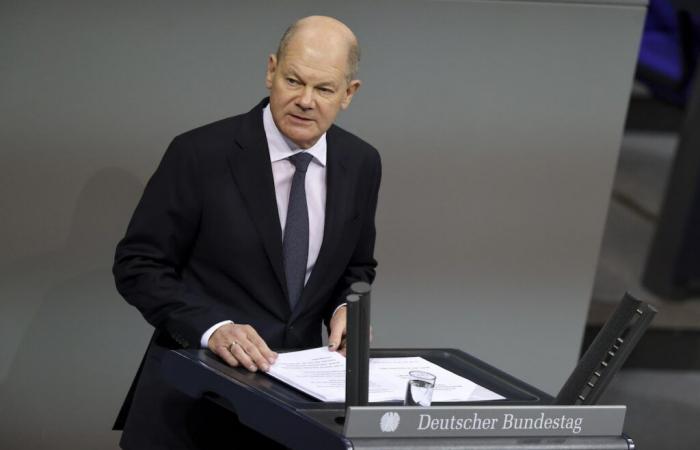Germany will go to early elections on February 23rd, Chancellor Olaf Scholz has been voted out of confidence by the Bundestag. The vote leaves no room for interpretation: 207 deputies expressed their confidence, 394 voted no, 116 abstained.
Scholz disheartened, Germany is in political crisis
The Social Democratic Chancellor Olaf Scholz has lost the trust of Bundestag: formal epilogue of an internal crisis within the government coalition that exploded last month, and of a pact to bring the country to early voting subsequently signed by the two major traditional parties, l’Spd e la Cdu. The Chancellor himselfno, will go to the President of the German RepublicFrank-Walter Steinmeier, to present his resignation and ask him to dissolve the Chambers and call new elections.
The vote of no confidence in Parliament came after an intense debate in the Chamber. Olaf Scholz, 66 years oldDespite what happened, he should run for another mandate, but in the polls he is far behind the conservative opposition leader Friedrich Merz of the Christian Democratic Union, the party of former Chancellor Angela Merkel.
After more than three years in power, the coalition led by Scholz’s Social Democratic Party (SPD), with the Greens and the Liberal Democratic Party (FDP) broke down on November 6. Germany has been in political crisis for months as it tries to revive its economy, hit by energy prices and stiff competition from China.
Merz: “You, Mr. Scholz, do not deserve to be trusted.”
The Berlin government it must also face the challenges posed by Russia’s war in Ukraine and the imminent return of Donald Trump to the White House, which calls into question future trade relations with the United States. These issues were at the center of the heated debate in the Bundestag between Scholz, Merz and other political leaders.
During the debate, Scholz argued that his government had managed to strengthen the armed forces that previous governments, led by CDUthey had left “in a deplorable state”. The German Chancellor himself said: “It’s time to invest forcefully and decisively in Germany. A highly armed nuclear power [la Russia] is declaring war in Europe just two hours’ flight away from us.” Merz’s response did not take long to arrive: “I left the country in one of the biggest economic crises of the post-war period. He had his chance, but he didn’t take advantage of it. You, Mr. Scholz, do not deserve to be trusted“.
The “traffic light coalition” in crisis
The crisis was triggered by the withdrawal of the Liberals from the so-called “traffic light coalition”which he held together with the government from 2021 l’Spd by Chancellor Olaf Scholz, i Verdi of the Minister of Economy Robert Habeck ei Liberals of the now former Finance Minister Christian Lindner.
The latter was dumped by Scholz after weeks of friction which, in fact, ended up triggering the government crisis. The clash between the different souls of the majority took place on multiple fronts. First of all, Berlin’s rigid rules on budget austerity, strongly supported by the Liberals and criticized by the Greens, who would like to inaugurate a new season of public investments.
In recent weeks, Lindner’s party (liberals) – in free fall in the polls – has made some demands deemed inadmissible by its allies. Among these, the elimination of Bcitizen’s allowance (similar to citizen’s income) and the heat pump law to support gas heating systems.
Scholz’s speech to the Bundestag
Speaking in the Bundestag, Olaf Scholz said: “Everyone recommends making public investments. Are they all wrong? If there is a country in the world that can afford to invest in the future, it is us.” During his speech to Parliament he reiterated: “I will fight to raise the minimum wage to 15 euros an hour. Respect also means being able to live off your work. In the last legislature I promised to bring the minimum salary to 12 euros. I have kept this commitment.”ensuring that Germany will continue to be “Kiev’s biggest supporter in Europe”, but also reiterated that “With me as Chancellor, German soldiers will not be sent to Ukraine.”
Early election date: could be February 23rd
The President of the Republic, Frank-Walter Steinmeier, will decide the date of the early elections. The Social Democrats and CDU/CSU, the two main political forces, have already identified a date: Sunday 23 February.
According to the latest polls, at least for now, the centre-right would be in the lead Cduthe party led for many years by Angela Merkel, with a consensus of around 32%. Next up: the far right of Alternative for Germany with 19%, theSpd with 17% ei Verdi with 12%. Finally, Sahra Wagenknecht’s rossobruni are further behind (7%), i liberals of Lindner (5%) and the Left (3%).
If the elections were to take this turn and confirm the poll percentages, the next German Chancellor could be the leader of the centre-right, CduFriedrich Merz. Ma What kind of government coalition would lead the country?
Featured Photo Source: open.online
© ALL RIGHTS RESERVED
Articles owned by Voci di Città, released under Creative Commons license.
You are free to redistribute and reproduce them, citing the source.






